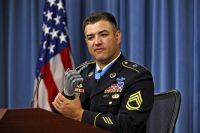WASHINGTON — The Army Ranger who received the Medal of Honor from President Barack Obama at a July 12 White House ceremony told reporters yesterday he’s still the same person.
Army Sgt. 1st Class Leroy A. Petry spoke to the media here after a ceremony inducting him into the Pentagon’s Hall of Heroes.
Petry smiled often as he answered questions. The medal, to him, is mostly something he wears with his dress uniform, he told reporters.
“It’s a decoration, it’s not a depiction of who I am,” he said. “So I am still me. The medal is just a decoration that they thought I deserved.”
Petry was assigned to Company D, 2nd Battalion, 75th Ranger Regiment, when he took part in the operation that earned him the nation’s most prestigious medal.
On May 26, 2008, Petry — then a staff sergeant — and a platoon-plus of nearly 60 Rangers flew by helicopter into an area of Afghanistan’s Paktia province on a rare daylight raid to kill or capture a high-value Taliban target.
“I was a little bit nervous, because daylight raids are rare for us,” he said, adding that Rangers normally launch such raids at night.
The men came under fire as soon as they landed, he said.
“Just to give you an idea of the terrain, it was a lot of mud walls, some farm fields … a rural environment [with] four or five different little compounds within a small area.”
During the now widely reported firefight that followed, Petry was shot through both legs, which he said felt at the time as “a quick strike of the hammer” on his left thigh. He found cover with two younger Rangers, and reported by radio to the unit’s command element.
A grenade exploded almost on top of the three men, and then Petry turned his head to see another grenade on the ground between him and the other Rangers.
“I immediately knew it wasn’t one of ours, because we haven’t used ‘pineapple’ grenades in quite some time,” he said. “[My] immediate reaction was, get it out of here.”
Petry said the grenade was “definitely inside the kill radius.”
“The kill radius is about 5 meters. We would have [been] definitely … if not definitely dead, not pretty, to say the least,” he said.
He grabbed the grenade and hurled it away from the men’s position, but it exploded as he released it, severing his right hand.
“I didn’t feel any pain,” he said. “I looked at it. I remember it so vividly — the blood coming out, oozing … the radius and ulna poking up about a quarter of an inch. The smell was a mixture of blood, gunpowder, burn.”
His arm “looked pretty grotesque,” he said, but after a split second he fell back on his training, applied a tourniquet and radioed in: “We’re still taking heavy contact. We’re getting small-arms fire. I just lost my hand. Over.”
Petry was evacuated out shortly after that, but the Army took note of his actions that day, ultimately resulting in the citation a White House audience heard this week. “Although picking up and throwing the live grenade grievously wounded Staff Sergeant Petry, his gallant act undeniably saved his fellow Rangers from being severely wounded or killed,” the citation reads in part.
One Ranger, Army Spc. Christopher Gathercole, died in that day’s fighting, and Petry said every year the men of Company D gather to remember him and celebrate his life. Petry said he is honored to have Gathercole’s name on a list of fallen Rangers inscribed on his prosthetic arm. The bionic hand he now uses amazes him, he said.
Though “it’s never going to be as fast as a real hand to pull a trigger again or bounce a basketball,” he acknowledged, his prosthetic arm accepts attachments designed for golf, a new sport for him, and a set of culinary knives he said he uses constantly in the kitchen to cook for his family. “I really haven’t found too much that I need help with,” he said.
Petry said his recovery after his injuries was “the greatest time for me.”
“I’ve learned so much from other service members who have been wounded and injured, he said, expressing amazement at the resilience he has seen in his fellow wounded warriors. “They’re all wanting to go back [and] do some type of work,” he said.
Severely injured warriors display leadership from the lowest levels, Petry said.
“Nobody thinks they’re ever the worst,” he said. “We try to motivate each other.”
Petry still is a Ranger, and said when the time came to decide, he knew he would miss his “Ranger brothers” if he left the service.
“A job had come up where I could mentor, lead and still help the Army,” he said. “So I chose to help wounded soldiers … and their families, for the Special Operations Command in Florida.”
He works harder and longer hours in that job than he did as a combat soldier, Petry said, “but it’s just as rewarding.”
Petry said while he never expected to earn the Medal of Honor, he wears it on behalf of his heroes in uniform.
“All these officers and sergeant majors … and young men and women when they join the service, who end up putting 20 years in, and still dedicated and saying, ‘Yes, I will, yes, I will — 30 years, 30-plus years,” he said. “How is that not a hero?”
Petry said his message to the country and his fellow service members is, “Never forget … your fallen heroes who paid the ultimate sacrifice, but embrace the living, those continuing to serve in the uniformed services and those overseas continuing in the fight.”
Source:
U.S. Department of Defense
Office of the Assistant Secretary of Defense (Public Affairs)

 von
von 